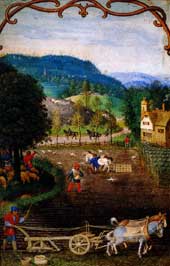Mutual Pledge System
Alfred the Great (870 - 901) establishes an organized system of community self-responsibility in which people pledge to help protect their neighbors. Communities are
divided into ten-family groups called tithings. Every ten tithings, or 100 families, is called a hundred. Each tithing is responsible for maintaining peace within its
own boundaries. If a member of the community witnesses a crime, he must raise a hue and cry, then round up his neighbors to pursue the criminal. If a tithing fails to
apprehend the supposed lawbreaker, all members are subject to fines by the Crown. This mutual pledge system ensures that neighbors share in crime control, and is
the prevalent method used to maintain public safety during the Middle Ages.
 |
| The Book of Hours, October c.1230-1260 |